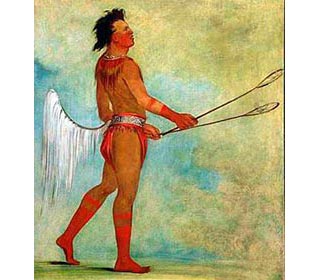The names of the Louisiana tribes included the Adai, Alabama or Alibamu, Apalachee, Muskogee Creek, Avoyel, Bayogoula, Tunica - Biloxi, Caddo, Chatot, Chawasha, Chitimacha, Choctaw, Houma, Koasati aka Coushatta, Koroa, Mugulasha, Atakapa, Natchez, Okelousa, Opelousa, Ouachita, Pascagoula, Quapaw, Quinipissa, Souchitioni, Tangipahoa, Tawasa were Muskhogean, Washa and Yatasi. Fast Facts about the History of Louisiana Indians
The climate, land, history, environment and natural resources that were available to the indigenous Indian tribes in Louisiana resulted in the adoption of the Southeast culture. - Name of State: Louisiana
- Meaning of State name: Named after King Louis XIV of France in 1682.
- Geography, Environment and Characteristics of the State of Louisiana: Low country on the Gulf coastal plain and the Mississippi alluvial plain with many lagoons and lakes
- Culture adopted by Louisiana Indians: Southeast Cultural Group
- Languages: Muskogean language
- Way of Life (Lifestyle): Hunter gatherers and hunter farmers
- Types of housing, homes or shelters: Asi Wattle and Daub houses
History Timeline of the Louisiana Indians - 10,000 B.C. : Paleo-Indian Era (Stone Age culture) the earliest human inhabitants of America who lived in caves and were Nomadic hunters of large game including the Great Mammoth and giant bison
- 1000: Mississippian Culture established. This was the last of the mound-building cultures of North America in Midwestern, Eastern, and Southeastern United States
- 100BC: Organised farming in the Louisiana region began at this time with the cultivation of crops such as squash, sunflowers, beans and maize.
- 1519: Alvarez de Pindea explores the mouth of the Mississippi
- 1541: Hernando de Soto explores the Mississippi River
- 1682: Robert Cavalier, Sieur de la Salle claims the territory for King Louis XIV of France and names the area La Louisianne after the French King
- 1700's: Chickasaw, Natchez and Yazoo warriors raiders attacked enemy tribes to capture slaves
- 1719: The first large importation of black slaves
- 1729: Following the Natchez Wars of 1716, 1722 and 1723 the Natchez Rebellion (1729–1731) when Natchez Indians massacre 250 people at Fort Rosalie.
- 1736: The Chickasaw Wars (1736, 1739 and 1752) were fought between the Chickasaw allied with the British against the French and their allies the Choctaws and Illini.
- 1754: (1754-1763) French and Indian War known in the US as the Seven Years War, (part of the French and Indian Wars) between the colonies of France allied with the Wabanaki Confederacy, Algonquin tribes, Abenaki, Míkmaq, Mohawk, Lenape, Ojibwa, Ottawa, Shawnee, Wyandot and Great Britain allied with the Iroquois Confederacy, Onondaga, Oneida, Seneca, Tuscarora, Mohawk, Cayuga, Catawba and Cherokee tribes
- 1762: France cedes the Louisiana Territory to Spain.
- 1763: Treaty of Paris
- 1775: 1775 - 1783 - The American Revolution.
- 1776: July 4, 1776 - United States Declaration of Independence
- 1800: Third Treaty of San Ildefonso of 1800 between Spain and France, by which Spain returned Louisiana to France
- 1803: The Louisiana Purchase - Napoleon sells the entire Louisiana Territory to the U.S. for $15 million
- 1812: 1812 - 1815: The War of 1812 between U.S. and Great Britain, ended in a stalemate but confirmed America's Independence
- 1812: Louisiana becomes the 18th state of the United States
- 1830: Indian Removal Act
- 1832: Department of Indian Affairs established
- 1834: The First Dragoon Expedition of 1834 (also called the Dodge-Leavenworth Expedition or Pawnee expedition) was the first official contact between the US government and the Plains Indians including the Pawnee and Comanche
- 1861: 1861 - 1865: The American Civil War.
- 1862: U.S. Congress passes Homestead Act opening the Great Plains to settlers
- 1865: The surrender of Robert E. Lee on April 9 1865 signalled the end of the Confederacy
- 1865: 1865-1868 - Campaign against Indians in southern Oregon, Idaho (Territory) and northern California.
- 1878: Yellow fever epidemic kills more than 5,000 people in Louisiana
- 1887: Dawes General Allotment Act passed by Congress leads to the break up of the large Indian Reservations and the sale of Indian lands to white settlers
- 1969: All Indians declared citizens of U.S.
- 1979: American Indian Religious Freedom Act was passed
History of Louisiana Indians - Destruction and Decline
The history of the European invasion brought epidemic diseases such as tuberculosis, cholera, influenza, measles and smallpox. The Native Indians of Louisiana had not developed immunities against these diseases resulting in huge losses in population. Exploitation including the leverage of taxes, enforced labor and enslavement were part of their history, taking their toll on the Louisiana Indians. |
